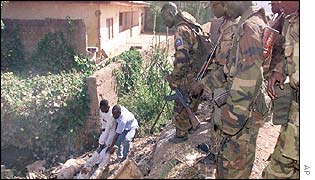| NEWS | SPORT | WEATHER | WORLD SERVICE | A-Z INDEX | ||||||||
|
| You are in: Africa | |||||||||||||||||||||||||||||||||||||||||||||||||||||||||||||||||||||||||||||||||||||||||||||||||||||||||||||||||||||||||||||||||||||||||||||||||||||||||||||||||||||||||||||||||||||||||
|
Friday, 20 December, 2002, 10:03 GMT
Kaduna: Nigeria's religious flashpoint

More than 200 Kaduna residents were killed in the riots
For Theresa, such violence against the church in which she worships is incomprehensible. And learning to live in peace with the Muslims who did this will not be easy. "We can only live side by side if they realise that what they did is wrong. If they can restore these things and realise their fault and say they are sorry we can still live together, but without that there is no peace," she says. 'Myopic' Just as Christian communities have been devastated by the violence, so too have Muslims. Just a few miles away from the church is a feeding centre for many hundreds of Muslims who lost their homes and livelihoods during the riots. With babies tied to their backs, and holding onto their children in the crowd, women, heavily veiled has tradition demands, line up to receive their ration of food and clothing.
In this district, Muslim community leaders, such as Nafiu Baba Ahmed, are frustrated with the failure of government to play a part in reducing tensions between the communities. "Crises are inevitable in every society, but a small crisis, if not properly managed, can lead to a big conflagration. This is typically what has been happening in this country." He says he is pessimistic. "I am, as long as we have this crop of leadership, who see things from a myopic point of view, from a one-track minded angle. It is political, it is political." Bullet wounds I have come now to a hospital to see some of the injured. Many people have sustained gunshots wounds and they say that many were caused by security forces, by the army and the police.
"In fact, we had about 200, about 180 were bullets from gunshots. That's almost all, that's about 90% with gunshots. Just very few of them had machete wounds like that. "Most of them claim that they were shot by the soldier men," says Dr Abdulrahman Sulaiman. Dr Sulaiman was on duty at the hospital throughout the crisis. And whilst the army did have a difficult job restoring order to a very chaotic situation, questions must be asked about the very high casualty rate inflicted by them on ordinary civilians. Unaccountable A local Muslim man, Mohammed Awal, speaks for many caught up in the violence. "Our security agents actually contributed a lot," he says.
"Instead of them defending the interests of the community they were out and they were one-sided, so we are using this opportunity to call upon the federal government. Let them be sincere in a situation like this, let them give us justice, and not take a side in a situation like this." It is a measure of unaccountability of the armed forces, that there has as yet been no investigation, formal or otherwise, into their methods of tackling unrest such as in Kaduna. And, with elections just around the corner in Nigeria, the politicians have been extremely reluctant to speak out to condemn the perpetrators of violence on all sides, for fear of losing support. Which is not an encouraging sign for those seeking lasting peace between Muslims and Christians across northern Nigeria.
|
See also:
04 Dec 02 | Africa
30 Nov 02 | From Our Own Correspondent
03 Dec 02 | Africa
29 Nov 02 | Africa
25 Nov 02 | Africa
Internet links:
The BBC is not responsible for the content of external internet sites Top Africa stories now:
Links to more Africa stories are at the foot of the page.
|
|||||||||||||||||||||||||||||||||||||||||||||||||||||||||||||||||||||||||||||||||||||||||||||||||||||||||||||||||||||||||||||||||||||||||||||||||||||||||||||||||||||||||||||||||||||||
|
Links to more Africa stories |
 |
|
|||
| ----------------------------------------------------------------------------------
To BBC Sport>> | To BBC Weather>> | To BBC World Service>> ---------------------------------------------------------------------------------- © MMIII | News Sources | Privacy |
~RS~a~RS~International~RS~q~RS~~RS~z~RS~48~RS~)